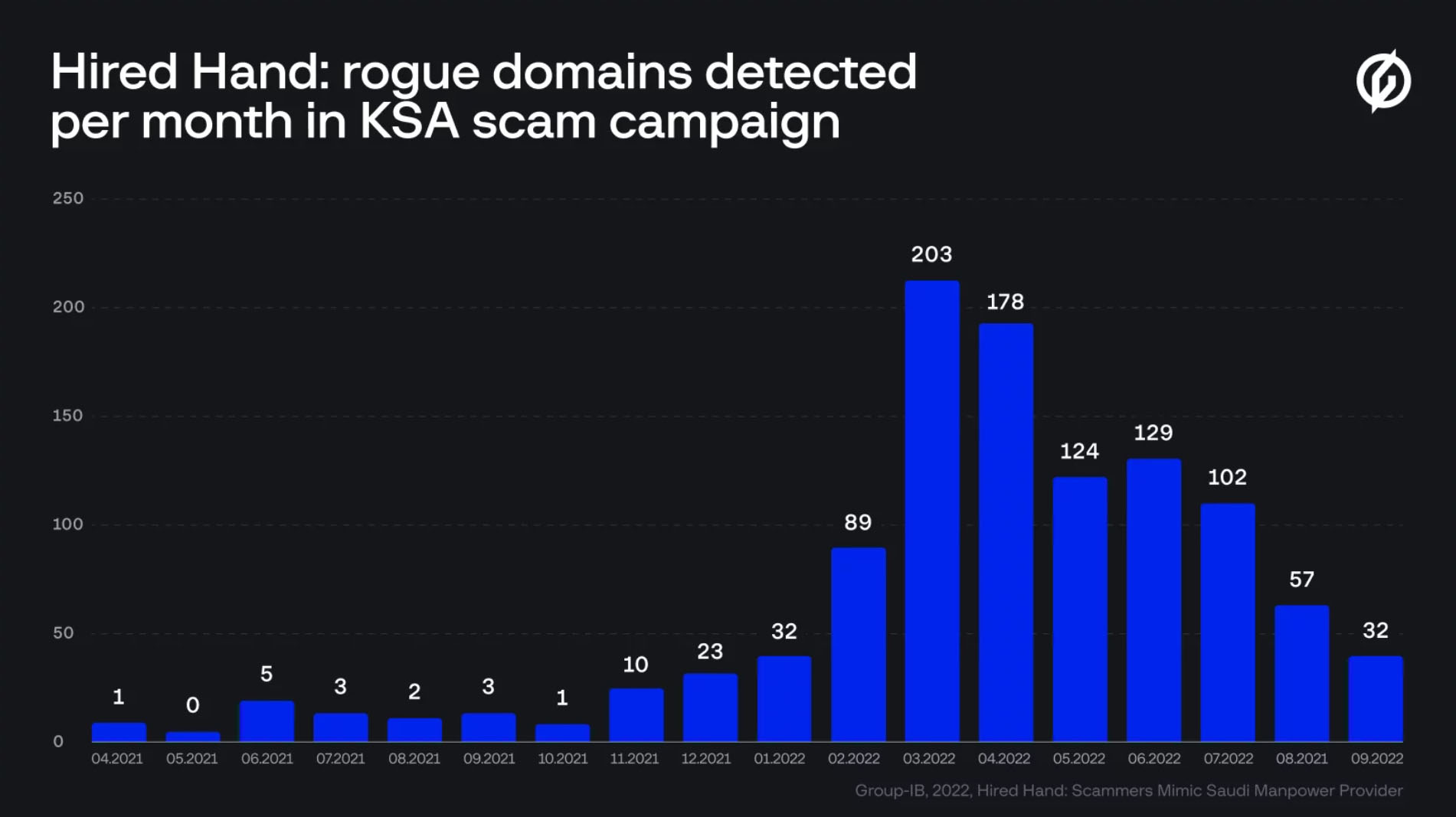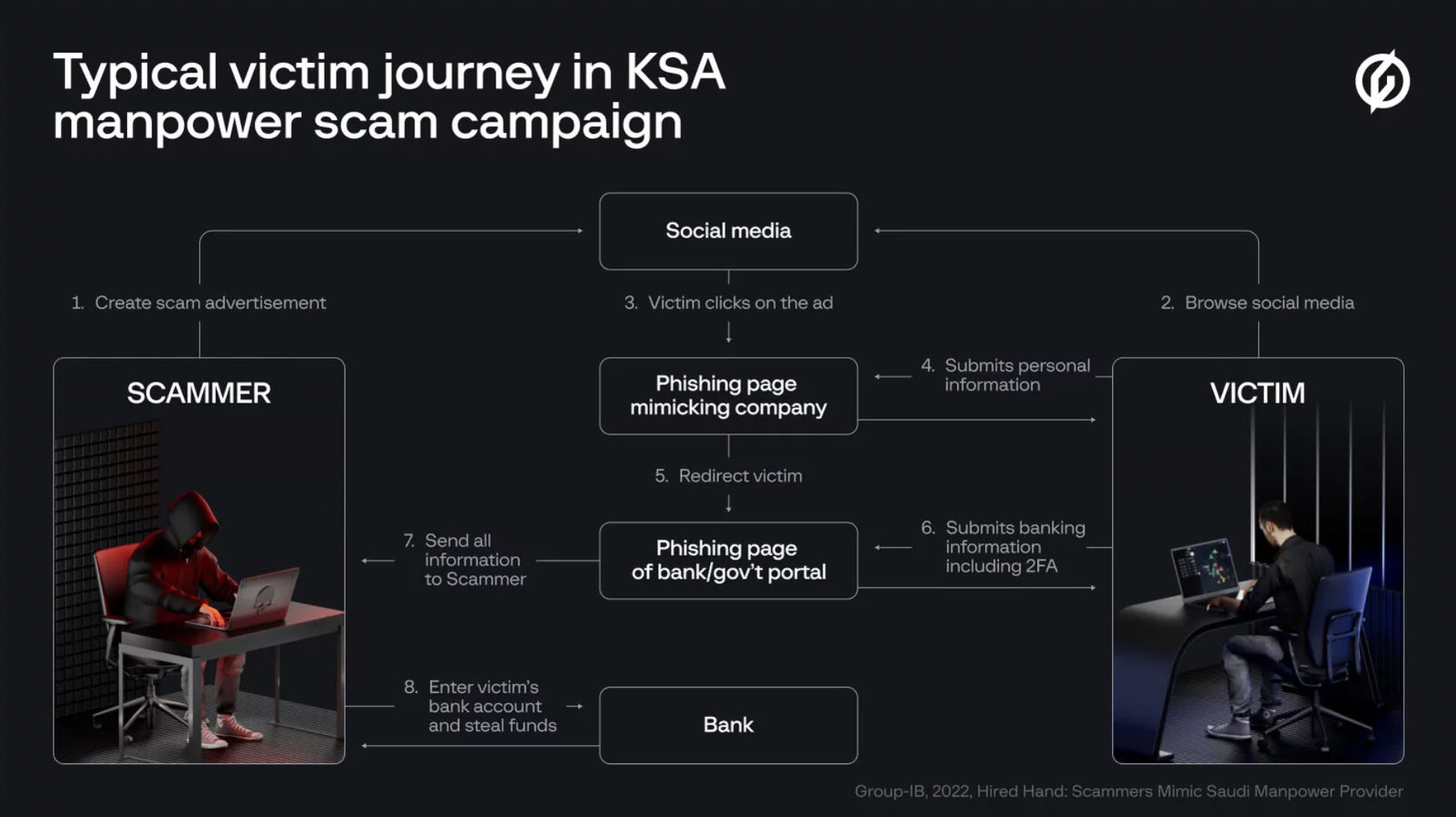News
Widespread Phishing Scam Discovered In Saudi Arabia
Group-IB, a global cybersecurity firm, has published research into a scheme where scammers impersonate one of the leading manpower agencies in Saudi Arabia.

Analysts from a leading cybersecurity firm, Group-IB, have uncovered a massive phishing scam operation meant to impersonate one of the Kingdom of Saudi Arabia’s top recruitment agencies.
The cybersecurity team found at least 1,000 malicious domains during their research, with most containing a close match to a well-known Saudi agency that offers assistance in hiring employees for the construction and services sector, as well as domestic workers. Scams of this nature are growing at a rate of 10% per year, with more than $55 billion stolen during 2021 alone.

How The Scam Worked
The fake domains and their associated URLs were meant to fool people into thinking they’re the real deal. In addition, each domain featured convincing web pages designed to mimic the official agency website. Scammers were using these web pages to convince people to enter their data, hoping to harvest banking details, as well as both login information and two-factor authentication (2FA) codes.

To drive traffic to these fraudulent websites, the criminals used multiple layers of social engineering, first using ads on Facebook, Twitter, and Google that encouraged SMS or WhatsApp conversations, and then sending unwitting users to the fake sites to enter their details.
Once a user had landed on a fake domain, they were persuaded to part with a small processing fee of 50 or 100 SAR (approximately $13 or $27), which enabled the scammers to harvest banking data to empty accounts and make off with user’s hard-earned cash.
Also Read: Is Your Phone Hacked? How To Find Out & Protect Yourself
“Scammers are becoming increasingly resourceful and collaborative, and spoof domain brokers are actively assisting cybercriminals. We encourage companies and organizations to monitor for signs of brand abuse, and we also urge internet users to remain vigilant so that they do not become victims of scams such as this,” says Mark Alpatskiy, CERT-GIB Senior Analyst.
Falling victim to a phishing scam can be costly, and Internet users are urged to show caution and always check URLs to verify they are legitimate before entering any personal data, as well as ensuring they are in communication with online chat services or call centers of the official company in question.
News
Rabbit Expands Hyperlocal Delivery Service In Saudi Arabia
The e-commerce startup is aiming to tap into the Kingdom’s underdeveloped e-grocery sector with a tech-first, locally rooted strategy.

Rabbit, an Egyptian-born hyperlocal e-commerce startup, is expanding into the Saudi Arabian market, setting its sights on delivering 20 million items across major cities by 2026.
The company, founded in 2021, is already operational in the Kingdom, with its regional headquarters now open in Riyadh and an established network of strategically located fulfillment centers — commonly known as “dark stores” — across the capital.
The timing is strategic: Saudi Arabia’s online grocery transactions currently sit at 1.3%, notably behind the UAE (5.3%) and the United States (4.8%). With the Kingdom’s food and grocery market estimated at $60 billion, even a modest increase in online adoption could create a multi-billion-dollar opportunity.
Rabbit also sees a clear alignment between its business goals and Saudi Arabia’s Vision 2030, which aims to boost retail sector innovation, support small and medium-sized enterprises, attract foreign investment, and develop a robust digital economy.
The company’s e-commerce model is based on speed and efficiency. Delivery of anything from groceries and snacks to cosmetics and household staples is promised in 20 minutes or less, facilitated by a tightly optimized logistics system — a crucial component in a sector where profit margins and delivery expectations are razor-thin.
Despite the challenges, Rabbit has already found its stride in Egypt. In just over three years, the app has been used by 1.4 million customers to deliver more than 40 million items. Revenue has surged, growing more than eightfold in the past two years alone.
Also Read: Top E-Commerce Websites In The Middle East In 2025
CEO and Co-Founder Ahmad Yousry commented: “We are delighted to announce Rabbit’s expansion into the Kingdom. We pride ourselves on being a hyperlocal company, bringing our bleeding-edge tech and experience to transform the grocery shopping experience for Saudi households, and delivering the best products – especially local favorites, in just 20 minutes”.
The company’s growth strategy avoids the pitfalls of over-reliance on aggressive discounting. Instead, Rabbit leans on operational efficiency, customer retention, and smart scaling. The approach is paying off, having already attracted major investment from the likes of Lorax Capital Partners, Global Ventures, Raed Ventures, and Beltone Venture Capital, alongside earlier investors such as Global Founders Capital, Goodwater Capital, and Hub71.
























